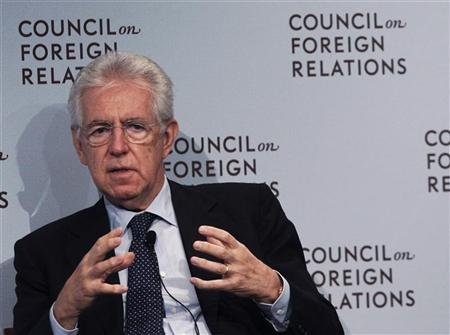By Steve Scherer
Italian Prime Minister Mario Monti unveiled plans for a corruption commissioner on Wednesday as the government pushed ahead with an anti-graft law to shore up public confidence in a political system battered by a succession of lurid scandals.

corruption and bribery
With national elections just months away, a series of scandals involving local government politicians has further hurt the image of Italy’s already widely distrusted political class.
The backlash is giving populist politicians a boost while the traditional parties are in disarray, heightening the chance that the vote will not give a strong mandate to anyone.
The cases, involving local politicians accused of embezzling party funds to buy cars and luxury holidays have added new urgency to the drive to approve an anti-graft bill that has been languishing in parliament.
“The symbolic value of the law is high, especially with elections on the horizon,” said Alberto Vannucci, author of “Atlas of Corruption”, a book about Italian graft.
“Twenty years after forgetting about the issue, finally a ruling class is doing something about a corruption problem that has been forgotten for too long,” said Vannucci
Two decades after the “Bribesville” scandals that brought down Italy’s Cold War-era political establishment, the new wave of graft, sometimes involving organized crime, is playing out in court houses, newspapers and on TV.
Police on Wednesday arrested a senior official in Lombardy, Italy’s richest region, for buying votes from the southern Calabrian mob, which is deeply embedded in the north. That came after Monti dissolved the government of the southern regional capital Reggio Calabria because of mafia infiltration.
“Corruption was systemic before the bribesville scandal, and it remains systemic today,” Vannucci said.
The latest polls show the scandals have boosted Genoese comic Beppe Grillo’s populist 5-Star Movement. It has become the second-largest bloc behind the leading centre-left Democratic Party, relegating the once-dominant People of Liberty (PDL) party of former Prime Minister Silvio Berlusconi to third place.
To shore up confidence in the political system and show that something is being done to stem corruption, Monti’s unelected technocrat government is trying to push through an anti-graft bill that the Senate will vote on next week.
The bill, which has languished in parliament for two years without being approved, increases penalties for some forms of fraud and bribery, introduces new crimes like influence peddling, and bars convicted swindlers from running for all levels of office.
If approved in the Senate next week, it will go to the lower Chamber of Deputies before becoming law.
The government on Wednesday also unveiled legislation to create an anti-corruption commissioner with investigative powers, and announced constitutional changes to regain control over spending by regional governments that have been at the centre of many shocking cases.
OYSTERS AND CHAMPAGNE
The tales of extravagant corruption come as Italians suffer in a deep recession and under painful new taxes introduced by Monti to save the euro zone’s third-biggest economy from a Greek-style debt crisis.
In the region of Lazio, which includes Rome, a highly paid regional party official allegedly siphoned off millions of euros of public campaign financing to holiday in the French Riviera, dine on oysters and champagne at exclusive restaurants, and buy a BMW 4×4 when it snowed in Rome, according to prosecutors.
He was arrested earlier this month, and another Lazio regional official was put under investigation for misusing public funds on Wednesday, judicial sources said. The PDL head of the Lazio government was forced to resign over the scandal.
Pictures of toga-wearing Lazio officials partying last month coincided with news that U.S. company Alcoa had started shutting down its aluminum smelter on the island of Sardinia, putting 500 jobs at risk.
Monti said last week that the scandals had wrought “incalculable damage” to Italy’s image, and President Giorgio Napolitano declared that rarely since World War II had the country needed so badly “to recover its ideals and its sense of morals”.
Corruption cost taxpayers 60 billion euros last year, according to the country’s audit court, and about 4.5 million Italians were offered bribes, a European Commission survey published in February estimated.
THE MOB
Both recent cases in Lombardy, which includes Italy’s financial capital of Milan, included Calabria’s ‘Ndrangheta, which has overtaken Sicily’s Cosa Nostra as Italy’s most-powerful organized crime syndicate, according to investigators.
“Fighting corruption is also fighting organized crime,” Giovanni Kessler, head of the European Union’s anti-corruption office OLAF, told Reuters in his office in Brussels.
Kessler, who was formerly an Italian anti-mafia magistrate, encouraged the quick adoption of the new anti-graft legislation that the Senate is voting on.
“In Italy, we have a criminal code that dates back to the early 20th century, and the definitions of corruption were written in the 1930s. You cannot fight corruption with the tools you had 80 years ago,” he said in an interview.
Berlusconi, who has repeatedly been tried for corruption and is currently facing three other court cases, will still be able to run for parliament in the election, which is expected to take place in April, even if the new anti-graft legislation passes because he has never been convicted.
Critics of Berlusconi say that during his 17-year domination of politics which ended when he was forced out in favor of Monti last November, the anti-corruption drive of two decades ago was systematically undermined.
“Berlusconi has been very damaging, both symbolically and in concrete terms,” said the author Vannucci, who is also a professor of politics at the University of Pisa.
His PDL party has borne the brunt of the recent scandals. The officials arrested in Lombardy and Lazio were both members of the party. The PDL governor of Lombardy is also under investigation for corruption.
(Additional reporting by Valentina Consiglio and Roberto Landucci in Rome, and Sara Rossi in Milan; Editing by Barry Moody and Anna Willard)
This article was written by Steve Scherer and originally published on news.yahoo






